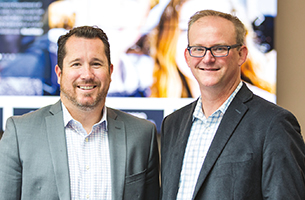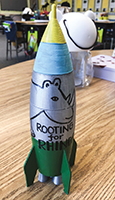Reimagined Staff Development
Type:
Article
Topics:
School Administrator Magazine,
Staffing, HR & Talent Development
June 01, 2018
A district in California ties micro-credentialing of teachers to their collaborative work with their students in solving real-world situations

Acknowledging these seemingly contradictory findings, the Laguna Beach Unified School District has been using a distinctive approach to professional development. This approach addresses what our own district’s 2016 survey of 30 rookie teachers found to be the No. 1 reason these individuals entered teaching: “Inspire students to change the world.”
To respond to this directly, our district created a staff development initiative in which the primary activity requires teachers to integrate the latest technology into lessons that allow students to solve real-world problems and explore global, local or even classroom issues. While doing so, the teachers attain micro-credentials on a four-level scale in their professional learning.
Demonstrating Outcomes
Laguna Beach named its initiative Rocket Ready, inspired by the can-do spirit of NASA’s Apollo missions. Launched in 2016-17, it challenges students and staff to work toward lofty goals.Unlike traditional professional development approaches in which teachers are paid to sit through full-day workshops, Rocket Ready pays teachers a $500 stipend for attaining each of four levels during the school year, but only when outcomes are met. The amount of time and effort will vary depending on teachers’ skills.
The three essential outcomes are (1) expanding the teacher’s personal learning network; (2) expanding the teacher’s technology skills in blended learning; and (3) solving a real-world problem with students.
The final outcome is demonstrated through video storytelling that the students and teachers create to share what their projects accomplished. These cannot be simulations but must be real-life projects to impact some condition inside or outside the classroom. Projects range widely across subject areas, taking on such concepts as “increasing gratitude” and “decreasing food waste at lunch.”
Each teacher must use technology to assess the passions and interests of each other and their students and use these passions to fuel their project. The project-based and blended-learning techniques teach students real-life skills that go well beyond the bare content standards.
Levels of Learning
Rocket Ready is planned as a three-year initiative. (Laguna is now finishing the second year.) Each year addresses an essential element of the Common Core standards that have been adopted in the district. In California, these standards have explicit technology components: collaboration in Year 1, communication in Year 2 and research in Year 3.We are using a gamification concept that allows teachers to move through four levels of professional learning in their journey. Completing each level not only earns the teachers a monetary stipend but also entitles them to a piece of a 3-D printed rocket as a badge, or micro-credential, of accomplishment.
Teachers can earn up to three additional $300 stipends by accomplishing additional challenges within their project:
» Cross-curricular component. Work with another teacher or several teachers to create a cross-curricular or grade-span project.
» Global awareness. Work together with a school in another country to address the stated problem.
» U.S. collaboration.Collaborate with teachers outside the district or state on a cross-curricular project.

When the principal of the school in Ghana, David Yayravi, stopped e-mailing for a week, the Laguna teachers grew concerned. When Yayravi finally wrote back, he explained he was out fishing for his students. That became a theme in the Rocket Ready project. Maybe Laguna Beach students are not in need of dinner, but teachers can ask “what do they need?” and “how do we fish for our students?”
One 4th grader begged his parents at Christmas time to send gifts to the Ghanaian students so they would know they are loved. The parent wrote to his teacher, “I’ve never made a donation with such joy as I did tonight! It made my year. Thank you for bringing humility and thoughtfulness to my son — a big gift indeed!”
Public Projects
Seventy percent of Rocket Ready teachers chose to do cross-curricular/grade-level projects. For example, art students at the high school partnered with 5th-grade students to bring awareness to the proliferation of plastic products that have been polluting bodies of water. The project culminated with an extensive art exhibit entirely made of recycled plastics and a 5th-grade artwork quilt that was subsequently exhibited in the Wyland Gallery in Laguna Beach, which contains large murals of ocean life created by an internationally recognized artist.While many of the projects have been science-related, such as increasing the school district’s capacity to store and use solar energy for use of laptops in Laguna’s classrooms, other remarkable projects have focused on social issues. Drama class students this year examined mental illness in the community by interviewing community members with bi-polar disorder. Armed with empathy, the students will write and perform a play in front of a live audience that illustrates the peaks and valleys of individuals who are dealing with mental illness.
“It is remarkable to see students hold a stake in their own education as they see their learning produce tangible, beneficial results for the world,” says Jun Shen, a high school social science teacher.
An English language arts teacher at one of our middle schools, Tammy Bonneville, says she appreciates that the staff development initiative recognizes her preference for independent learning.
“It was great having the time to learn and struggle through the new material. … I also enjoyed working with my team and coach to find new ideas and solutions to our problem,” Bonneville says. “We are collaborating with another school and working with teachers that we have never worked with in the district. This has been the best experience of my career.”
Confirmed Benefits
Hanover Research, an outside evaluator, looked at the effectiveness of the school district’s program through teacher surveys at the end of the first year. The firm found teachers increased their confidence in using technology regularly by 30 percent and increased their confidence in solving real-world problems with their students increased by 50 percent.We learned from the independent research that increasing the interactions of each personal learning network to require wider contact among professional educators would improve the training program. In the second year, we adjusted the levels to encourage more interaction and reflection with each teacher’s individual personal learning network.
“This project encourages our teachers to solve real-world problems with their students,” says Laguna Beach’s superintendent, Jason Viloria. “These memorable learning experiences are focused on skills that will be necessary for our students to be successful in the jobs of the future.”
Twenty-four teachers completed the first year of the Rocket Ready project, resulting in more than 75 hours of staff development for each teacher. Another 25 are expected to finish Year 2 this month. If these teachers had been told they were going to put in that many hours in the beginning, they probably would not have signed up, but because they were driven by their passion to address a real-world situation with their students, it became part of their identity as professionals.
Rocket Ready teachers are noticeably more engaged in the art and science of teaching, with increased motivation to create memorable learning experiences.
Author
Additional Resources
Rocket Ready is a homegrown staff development program in Laguna Beach, Calif.
The Center for Digital Education recognized Laguna Beach as a 2018 Digital School District winner. About a dozen school districts across the country have begun using variations of Rocket Ready, and others, including some outside the U.S., are considering similar professional development paths.
More details about Rocket Ready are available at www.RocketReady.org.
Rocket Ready is a homegrown staff development program in Laguna Beach, Calif.
The Center for Digital Education recognized Laguna Beach as a 2018 Digital School District winner. About a dozen school districts across the country have begun using variations of Rocket Ready, and others, including some outside the U.S., are considering similar professional development paths.
More details about Rocket Ready are available at www.RocketReady.org.
Advertisement
Advertisement
Advertisement
Advertisement



